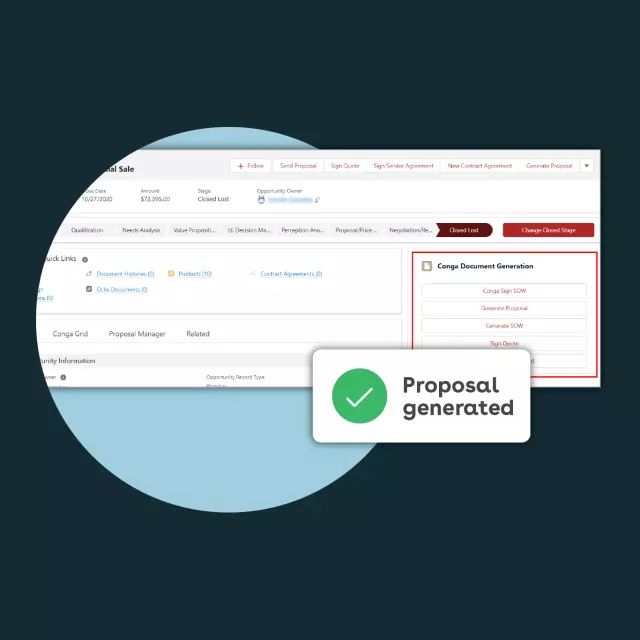
Why Salesforce Admins Are Switching to Conga Composer for Automated Efficiency

How to Implement the 80/20 Rule in Your Salesforce Operations
Salesforce Admins are the linchpins of any organization that uses the Salesforce platform. They are responsible for bridging the gap between business needs and technological solutions, ensuring the platform is optimized for operational efficiency, user adoption, data integrity, and customization.
However, manual processes can hinder the efficiency of Salesforce Admins, reducing productivity and limiting scalability. That's where the 80/20 rule comes into play as a transformative principle that can help Salesforce Admins streamline processes and focus on high-impact tasks.
In this blog post, we will explore how to implement the 80/20 rule in your Salesforce operations and show you why Salesforce Admins are switching to Conga Composer for automated efficiency.
The Pain Points of Manual Processes
As a Salesforce Admin, you understand the importance of operational efficiency. However, the reality is that manual processes can take up a significant amount of time, resulting in low operational output. Creating contracts, invoicing, and other administrative tasks takes away from other essential responsibilities, hindering organizational success and productivity.
Time-Consuming Tasks
Manually creating documents, updating records, and managing data entry can be tedious and time-consuming, causing frustration and job dissatisfaction amongst Salesforce admins. The time spent on these tasks could be better utilized towards strategic planning or other technical aspects of Salesforce management.
The Cost of Inefficiency
The cost of inefficiency due to manual processes can be substantial. It can increase labor costs due to longer processing time and reduced productivity. Furthermore, mistakes caused by manual input can result in financial loss, deteriorating customer loyalty, and, ultimately, damaging the organization's reputation.
The Human Error Factor
Manual input also introduces the risk of human errors, especially in producing contracts and other critical documents. A mistake, like an incorrect number or a misspelled name, can have severe consequences and jeopardize the entire business transaction. Human errors also harm data integrity, resulting in inaccurate reporting, affecting business decisions, and hurting the organization.
In conclusion, manual processes save time and also introduce the potential for costly errors that can harm an organization's financial and operational performance. As a Salesforce Admin, you should strive to reduce these inefficiencies to focus on what matters most – operational efficiency, user adoption, data integrity, and customization.
The 80/20 Rule Unveiled
What is the 80/20 Rule?
The 80/20 rule, known as the Pareto Principle, states that 80% of outcomes result from 20% of inputs. In other words, a few vital elements contribute to most of the desired results. This principle can be applied to business processes, where 80% of revenue comes from 20% of customers, or 80% of service requests come from 20% of customers. The 80/20 rule can help organizations pinpoint key focus areas, streamline processes, and maximize efficiency.
How it Applies to Salesforce Operations
In Salesforce operations, the 80/20 rule can revolutionize efficiency by focusing on the most impactful 20% of tasks. Salesforce admins can identify and optimize the most crucial functionalities with the most significant impact, leading to improved results. Admins can leverage Salesforce automation capabilities to eliminate redundant tasks that consume time and resources. By doing so, admins maximize effectiveness and efficiency in Salesforce operations, driving revenue and growth.
Real-world Success Story: Neshama Funeral Home
Let's take the example of Neshama Funeral Home. This organization spent a lot of time manually completing various forms needed for regulation compliance, such as generating documents for funerals and burials, completing paperwork for transferring bodies overseas, and generating proposals, contracts, and invoices for prospects. This process relied heavily on manual inputs, leading to inefficiencies, errors, and inconsistencies in data management.
Neshama Funeral Home realized that the manual processes were consuming too much time and negatively impacting their operations. They decided to implement the 80/20 rule by identifying the 20% of activities that produced the most significant impact. They discovered that automating the document generation process could significantly reduce the time required to complete regulatory forms, generate invoices and proposals, and ensure data consistency across the team.
With the help of Conga Composer, they automated these processes, saving almost 80% of the time spent on manual paperwork. The team also maintained data quality and consistency across all forms and reports. This led to increased efficiency and customer satisfaction, as Neshama Funeral Home could now process client requests much faster and with higher accuracy while ensuring legal compliance. By focusing on the 20% of tasks that mattered the most, they achieved tremendous results and revolutionized their efficiency.
By implementing the 80/20 rule in your Salesforce operations and using tools like Conga Composer, you can similarly automate your processes, reduce manual errors, and significantly improve your team's overall efficiency. Don't get bogged down by the complexities of Salesforce. Instead, focus on what matters the most and watch your operations soar.
Why Conga Composer is the Solution
Salesforce Admins are responsible for optimizing the platform's performance and ensuring maximum output across sales, marketing, and customer service. Unfortunately, manual document creation processes can be time-consuming and often result in errors, undermining the entire system's efficiency. This is where Conga Composer comes in handy, automating the document creation process and increasing efficiency across various operational roles.
Automated Efficiency and Consistency
One of the most significant benefits of Conga Composer is its document automation capabilities. With just a few clicks, you can create professional-looking documents such as NDAs, proposals, contracts, and invoices directly within Salesforce without requiring manual entry or data manipulation. That means less time spent copy-pasting information from one document to another and more time spent on high-value activities that help drive your business forward.
Moreover, Conga Composer is fully integrated with Salesforce, seamlessly integrating with your workflows, processes, and data sources. This enables you to create and send documents based on real-time data to ensure that the information you present is up-to-date and accurate.
However, efficient document creation is just one part of the equation. Another significant benefit of Conga Composer is its ability to ensure consistency across your entire business. By creating a centralized library of corporate-approved templates, you can be sure that every team member is using the correct version of each document and that your brand messaging and voice are being communicated consistently across the board.
Cost Savings
As a Salesforce admin, you understand the importance of optimizing your operations for maximum efficiency. One of the best ways to achieve this is by implementing the 80/20 rule, where you focus your efforts on the tasks that generate the most value for your business.
But how do you ensure that your team is not wasting precious time on manual document creation when they could be spending it on more important tasks? This is where Conga Composer comes in, offering a seamless integration with Salesforce that automates document creation.
The benefits are clear: By reducing the time spent on manual tasks, your team can redirect their efforts towards more value-adding activities, ultimately driving your business forward. With Conga Composer, your end-users can create complex documents in a fraction of the time it would take them to do it manually. Your business can save considerable money on labor costs while improving productivity and efficiency.
Enhanced Accuracy
When it comes to running a successful business, accuracy is paramount. However, errors can still occur despite the best efforts of even the most detail-oriented employees. These mistakes can devastate business operations and decision-making, leading to costly setbacks and missed opportunities.
Document automation capabilities offer a solution that significantly reduces the risk of human error. By leveraging the wealth of data stored in Salesforce or other data sources and integrating it with customizable templates, companies can efficiently generate accurate and reliable documents that meet their unique needs.
Not only does this automation process significantly reduce the potential for errors, but it also minimizes the need for manual data entry between Salesforce and other systems. The risk of erroneous data entries is significantly mitigated without cutting and pasting between multiple platforms. The result is a standardized process that leads to enhanced accuracy and higher-quality data, ultimately helping businesses make better-informed decisions about their growth.
So, if you're looking to improve efficiency and accuracy within your Salesforce operations, Conga Composer is the intelligent choice. With its automation capabilities and custom template options, this powerful tool can help your business operate at its best.
As a Salesforce Admin, implementing Conga Composer's automation capabilities into your operations will increase efficiency, cost savings, and enhanced accuracy. It's a no-brainer, and every Salesforce Admin should be jumping on the train to better solutions that will enhance the performance of their Salesforce platform.
How to Make the Switch
Switching from manual document creation to automated processes is critical to achieving efficiency in Salesforce operations, and Conga Composer is here to help. Here are the steps to make the transition:
Assessing Your Current Processes
Assessing your current document creation processes is the first step to implementing the 80/20 rule in your Salesforce operations. Take the time to identify which processes are causing the most headaches for your team.
- Where are the bottlenecks?
- Where are the errors creeping in?
- Are your users spending too much time manually inputting data into their documents?
Implementation
Now that you know how Conga Composer can revolutionize your Salesforce operations, it's time to get down to the nitty-gritty. The implementation phase can initially seem daunting, but it'll be a breeze with the right approach.
First, head to the Conga Composer AppExchange listing and install the 30-day free trial in your sandbox. This will allow you to test the software and see how it works in your organization. Once you've installed it, take some time to familiarize yourself with the features and functions.
Next, identify a few simple templates that you can test out. Start with one or two basic templates to understand how it works. Including merge codes into your templates is easy with the Conga Composer. Check out this video I recently posted on YouTube, showing how to find and insert your merge codes to create your first template.
One of the best things about Conga Composer is that you can create and update your templates in minutes. This makes it a snap to customize your templates on the fly and make changes based on feedback from your team.
Once you've created your templates, it's time to put them to the test. Generate a few sample documents, and ensure all your data is correct. This is a critical step in the process, as you want to avoid discovering errors after you've automated an entire process.
In conclusion, implementing Conga Composer is a straightforward process that can significantly streamline your operations. Remember to take it one step at a time, starting with simple templates and working your way up to more complex ones. By doing so, you'll be well on your way to implementing the 80/20 rule and achieving maximum efficiency.
Training End Users
One of the biggest perks of using Conga Composer is how easy it is for your team to learn and integrate into their daily workflow. With a simple installation process, your end-users will generate customized template documents with just one click.
Once the tool is installed, they'll have a custom button added to their Salesforce interface. When they need to generate a template document, they have to click the button, and voila - the document is automatically populated with Salesforce data.
With a tool this efficient, implementing the 80/20 rule in your Salesforce operations becomes easier than ever. Reducing manual input and increasing automated tasks can streamline your workflow and increase efficiency.
Your end-users will thank you for it!
In conclusion, Conga Composer is the key to unlocking efficiency, accuracy, and cost savings in your Salesforce operations. It is an investment that will transform your document creation processes and empower your team to focus on value-adding tasks, ultimately driving your business forward. Remember, every journey starts with a single step, and your journey towards automation starts with Conga Composer. Eager to learn more? Don't stop here! Explore the endless possibilities and the profound impact of automation on your business operations by clicking here to read Conga Composer's Buyers Guide to document automation. Let's take this step together toward a more efficient and productive future!




